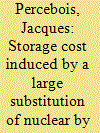| Srl | Item |
| 1 |
ID:
169888


|
|
|
|
|
| Summary/Abstract |
This paper explains some adverse effects due to a massive injection of renewables when electricity storage is not available, such as a fall of electricity prices on the spot market or a crowding-out effect for nuclear power stations due to the merit order logic. From the French experience, it presents a model that calculates the additional cost of electricity production when the share of nuclear generation is reduced to 50% instead of 72% today and when, in compensation, renewable energy (wind and solar) is stored either by batteries or by power-to-gas. The simulations minimize the cost of the energy mix by optimizing the electricity storage mix: batteries (daily storage) and Power-to-Gas/Gas-to-Power (seasonal storage). The paper also estimates the negative externalities of intermittent renewable energies that lie in between 44 and 107 €/MWh. It also examines the impact on the merit order when those negative externalities are accounted for. Finally, the simulation results lead us to provide some recommendations concerning R&D electricity storage policy and electricity mix fine tuning.
|
|
|
|
|
|
|
|
|
|
|
|
|
|
|
|
| 2 |
ID:
189268


|
|
|
|
|
| Summary/Abstract |
Sanctions are widely used foreign policy tools in reaction to crises in world politics. Accordingly, literature on sanction effectiveness—their intended consequences—is abundant. Yet, fewer studies address the unintended consequences of restrictive measures. This is remarkable given that negative externalities are well documented. Our article explores this phenomenon by asking under which conditions sanctions yield negative externalities. We develop a theoretical conceptualization and explanatory framework for studying the unintended consequences of UN sanctions. Empirically, we draw on data from the rich, but scarcely used Targeted Sanctions Consortium and apply qualitative comparative analysis (QCA) to examine negative externalities of UN sanctions, complemented by illustrations from the cases Haiti and North Korea. The results document the existence of multiple pathways toward unintended consequences, highlighting the negative impact of comprehensive and long-lasting sanctions, as well as the ability of autocratic targets with economic means to persist unscathed from sanctions.
|
|
|
|
|
|
|
|
|
|
|
|
|
|
|
|